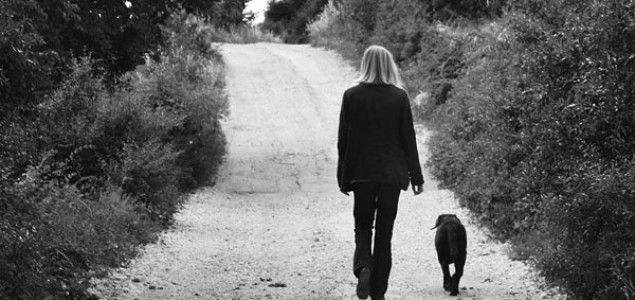Dangerous Life of Stefica Galic, Ljubuski’s Oskar Schindler
Povezani članci
- IVAR AMUNDSEN:Pozivam EU, Veliku Britaniju i Sjedinjene Američke Države da reaguju i spase BIH
- U Mostaru promocija knjige “Teatar u ratnom Sarajevu 1992. – 1995., svjedočanstva”
- Banjalučki Pale sam na svijetu
- Građanski savez upozorava: HDZ i Čović spremaju nasilje
- Viza za pakao
- Bajtal: Simbolički pečat agresorske politike ‘jamljenog’ u Mostaru

Almost two decades may have passed since the end of the Bosnian war but in the small town of Ljubuski, it is still smarter to keep silent about the war injustices, as the recent beating of journalist Stefica Galic showed.
Galic, the editor of the local news website tacno.net, was beaten up in mid-July and ever since she has been suffering public pressure and isolation, all because hers and her husband’s daring rescue of Bosniaks during the war was a subject of a documentary.
These days in Ljubuski, one of dozens of Croat towns scattered through the snake-infested mountains of Herzegovina, there is a conspiracy of silence about Stefica Galic.
During Balkan Insight’s visit to Ljubuski it was hard to find anyone prepared to talk to journalists openly. Even the doors of the town hall were locked – the mayor was on holiday.
Stefica Galic, could be called “Ljubuski’s Oskar Schindler” some day. But for now, she needs protection and medical treatment.
On July 18, during her regular afternoon walk, she was beaten up and injured by Ljubuski war veterans associations activist Vera Dedic, who continued to shout abuse at Stefica during the attack.
Vera Dedic and the Ljubuski war veterans were unhappy because of a screening of the documentary “Nedjo of Ljubuski” [“Nedjo od Ljubuskog”] in the town several days before.
The documentary, which is just 50 minutes long, tells the story of Stefica and her husband Nedeljko Galic, both Bosnian Croats from Ljubuski, who saved and protected their Bosniak fellow citizens when they were being expelled by the Croats during the Croatian-Bosniak conflict in 1993, during the war in Bosnia.
The documentary was made by the Sarajevo NGO Gariwo, the Bosnian branch of the global NGO “Garden of the righteous of the world“, Gariwo.
Gariwo is led by the human rights activist Svetlana Broz, the granddaughter of Josip Broz Tito, the founder and life long president of socialist Yugoslavia.
“Nedjo of Ljubuski“ uses the testimony of Galic’s friends, fellow citizens and the people they saved, to build an amazing story of human courage, nobility and a willingness to oppose war crimes and help the victims of another ethnicity.
Nedjo of Ljubuski
“People, stop, you can’t do that, it’s madness, it’s criminal!” wept Nedjeljko Galic on August 15, 1993, in front of Ljubuski police station, where the Croatian Defence Council, HVO, who formed the Croatian militia during the Bosnian war, started to gather Bosniaks and deport them to HVO prison camps Heliodrom, Dretelj and Gabela.
Years later, the six highest political and military figures of so called Herceg-Bosna, a Croat mini-state that was set up in Bosnia and Hercegovina during the war, were put on trial for those deportations at the Hague Tribunal, ICTY.
The verdicts for that trial, one of the longest in the history of the ICTY, are expected to be given next spring.
Back in 1993, the Herceg-Bosna authorities regarded the deportation of the Bosniak population not as a war crime, but as a legitimate method for creating an ethnically clean “Croatian state“ in Bosnia.
Nedjeljko and Stefica Galic recognised the criminality of the deportations from the very start, and, unlike many others, did what they could to prevent it.
In their small photo studio in Ljubuski – Nedjeljko was an amateur photographer and a photo-journalist before the war– Stefica and Nedjeljko falsified the affidavits of imprisoned Bosniaks so that they could be freed from the prison camps.
The authorities would release the detainees if they could prove with an affidavit that they knew someone they could go to outside Bosnia. According to the testimonies in the Gariwo documentary, the Galic family rescued about a thousand Ljubuski Bosniaks from the camps this way.
Almost all Bosniaks from Ljubuski, about 1,500 of them, were deported on August 15, 1993, which means that the Galic family managed to release two thirds of their Bosniak fellow citizens.
But for Nedjeljko, Stefica and their three children, that was just the first of a number of life changing events.
Disgusted by the violence during the war towards their fellow citizens, whom they had lived with in peace and friendship for years, they left Ljubuski in late 1993 and moved to the Czech capital Prague.
They refused to be classified as refugees, which would have given them a measure of financial security, claiming proudly that nobody had expelled them, and that they had left of their own free will.
They returned a year later, because Nedjeljko was badly homesick for his town.
They have lived in difficult financial conditions ever since, enduring the stigma of being called “Commies“ and “Yugonostalgics” in Ljubuski.
Eight years later, in 2001, Nedjeljko became ill and died. Stefica stayed in Ljubuski and became a journalist, editing the independent news website site tacno.net.
Tacno.net continues the tradition of opposing chauvinism and nationalism in Bosnia and Hercegovina.
Until “Nedjo of Ljubuski“ was filmed and screened in Ljubuski in July, she had never been directly threatened, but had had to suffer the constant low-level hostility that everyone who attempts to oppose chauvinism in Bosnia and Hercegovina and the former Yugoslavia must endure.
When “Nedjo of Ljubuski“ aired Ljubuski’s dirty washing in public, however, Stefica became a target for violent threats.
The screening, which was held at a city council hall in Ljubuski, had to be protected by a strong police presence, and there were street protests by war veterans associations after the film was shown.
Several days later, Stefica was beaten up.
“It was much worse elsewhere…”
The protests and violence are symptomatic of war crimes denial, which still afflicts Ljubuski 19 years after the crimes took place.
„Why didn’t Svetlana Broz make a documentary about her grandfather, Josip Broz Tito, who did so much wrong to this town“, said one Ljubuski citizen to Balkan Insight, angered by the screening of “Nedjo of Ljubuski“ in the town.
“I can’t speak about the deportations of the Bosniaks from Ljubuski because I was young then, but I know they live far better lives in western countries than we do here,“ said Ruzica Puljic, when asked about the deportations.
Several other Ljubuski residents, who refused to be named, told Balkan Insight that it is not fair to single out Ljubuski because of the deportations of Bosniaks from the town, “because it was much worse elsewhere”.
“At least, in Ljubuski nobody was killed,” they said.
The toxic atmosphere of denial culminated in the attack on Stefica Galic following the screening of the documentary.
She stopped appearing in public because of that, to try to calm the situation, and worried about her children, who were shocked when their mother was attacked,
family friends told Balkan Insight.
But in a statement published on tacno.net, Galic repeated that “everything she said in the ‘Nedjo od Ljubuskog’ documentary was pure truth, which she will never stop speaking about“.
Galic’s family had requested police protection, but the police failed to organise it, Stefica’s colleagues claim.
Amer Bahtijar, Stefica’s colleague and editor at tacno.net, said to Balkan Insight that the Ljubuski police had obstructed the investigation of the attack.
He said he personally witnessed one policeman in Ljubuski openly insulting Stefica in conversation with his colleagues.
Representatives of the USA, the EU and OSCE in Bosnia condemned the attack, but it does not seem it had any impact on either the police investigation or local public feeling.
Stefica Galic still lives under continuous hostile pressure in Ljubuski, but is determined not to be driven from her town, despite numerous invitations by the people she and her husband saved, who now live abroad.
“I’m worried about her and her children. I don’t know how they can cope,“ says a friend of Galic’s family, Fahro Konjhodzic, a journalist in Ljubuski before the war.
Konjhodzic was among the deported Bosniaks and now lives in Oslo, Norway, editing “Bosnian post”, a monthly magazine for Bosnian refugees living in Scandinavian countries.
Konjhodzic believes that Stefica Galic requires physical protection and support from the public and political elites of Bosnia and Herzegovina and Croatia, but is not optimistic that she will receive any.
It seems then that the “Schindler from Ljubuski“ must wait just a little longer – maybe even forever – for her city and her country to recognise her family’s courage, humanity and nobility.
Boris Pavelic is a journalist with the Croatian daily newspaper Novi List.


 ENG
ENG





























